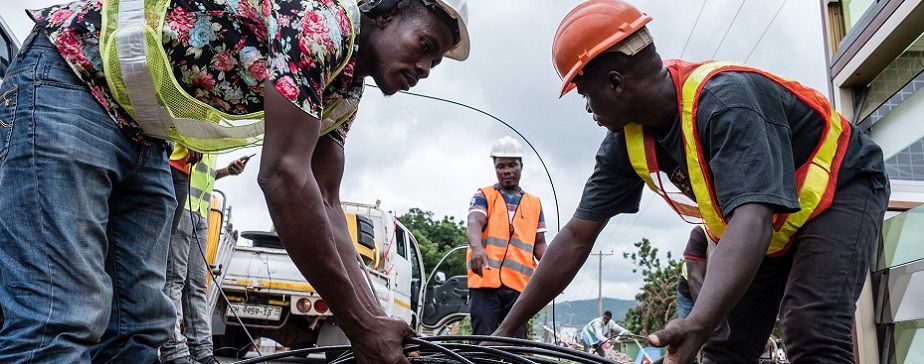 Workers laying fiber cables in Ghana to meet the growing demand for broadband connectivity. © Tom Saater/IFC
Workers laying fiber cables in Ghana to meet the growing demand for broadband connectivity. © Tom Saater/IFC
Deep, efficient, and well-regulated local capital markets create access to long-term, local-currency finance. They are the foundation of a thriving private sector—the key driver of jobs and sustainable growth.
Local capital markets support economic development.
Local capital markets can protect an economy from volatile capital flows, lower a country’s dependence on foreign debt, and provide vital risk finance. Most important, they can help bridge the developing world’s massive financing gaps by mobilizing savings to key sectors, like housing, climate, and infrastructure.
Yet most developing countries lack the necessary preconditions for a healthy capital market: stable macroeconomic fundamentals, a sound banking system, a good institutional and regulatory framework, an efficient market infrastructure, and sufficient market size.
The World Bank and IFC launched the Joint Capital Market Program (J-CAP) in 2017 to help developing countries realize the benefits of strong local capital markets. The initiative—supported by Australia, Germany, Japan, Luxembourg, Norway, and Switzerland—mobilizes resources across the World Bank Group to deliver country-tailored advice and investments that can create a systemic impact.
J-CAP is targeted to meet country-specific needs.
J-CAP is a five-year program initially focused on six priority countries and one sub-region: Bangladesh, Indonesia, Kenya, Morocco, Peru, Vietnam, and the West African Economic & Monetary Union. Going forward, the program will also work with other countries, including Argentina, to support local capital markets development.
Under the program, country-specific action plans have been produced that mobilize the World Bank’s technical assistance alongside IFC's demonstration transactions and local currency solutions.
In FY19, J-CAP identified opportunities to expand private sector engagement to deliver capital-markets financing in areas such as climate, housing, small and medium enterprises (SMEs), and infrastructure. In Kenya, J-CAP supports the World Bank's work with leading pension funds to establish a capital-market vehicle that will provide long-term financing for infrastructure projects. J-CAP is supported by IFC’s Creating Markets Advisory Window and development partners.
Under the J-CAP framework, World Bank and IFC experts work with policy-makers...
- to build a supportive enabling environment for healthy capital markets through technical assistance (i.e. modernizing market infrastructure, improving the regulatory framework and/or supervisory capacity-building)
- to provide guarantees (IFC, WB, MIGA) to reduce costs and attract private sector participation
- to offer local currency solutions (such as bond issuances, derivatives and structured products)
Under the J-CAP framework, World Bank and IFC experts work with investors...
- to mobilize local and global savings
- to ready for market transactions through advisory engagements
- to develop institutional investors (i.e., pension funds, mutual funds, and the like) and new instruments for investment capital (i.e., SME securitization, mortgage securities, infra funds, green bonds, and the like)
